Last Updated on September 29, 2022
Backyard composting is an easy way to help the planet and get rid of all your food scraps. We will guide you through the process and answer all your questions!
Whether you choose to go with outdoor worm composting, backyard compost tumbler, or any of the other methods we mention, it’s good for the environment. Creating your own organic compost is easy and a great way to improve your soil.
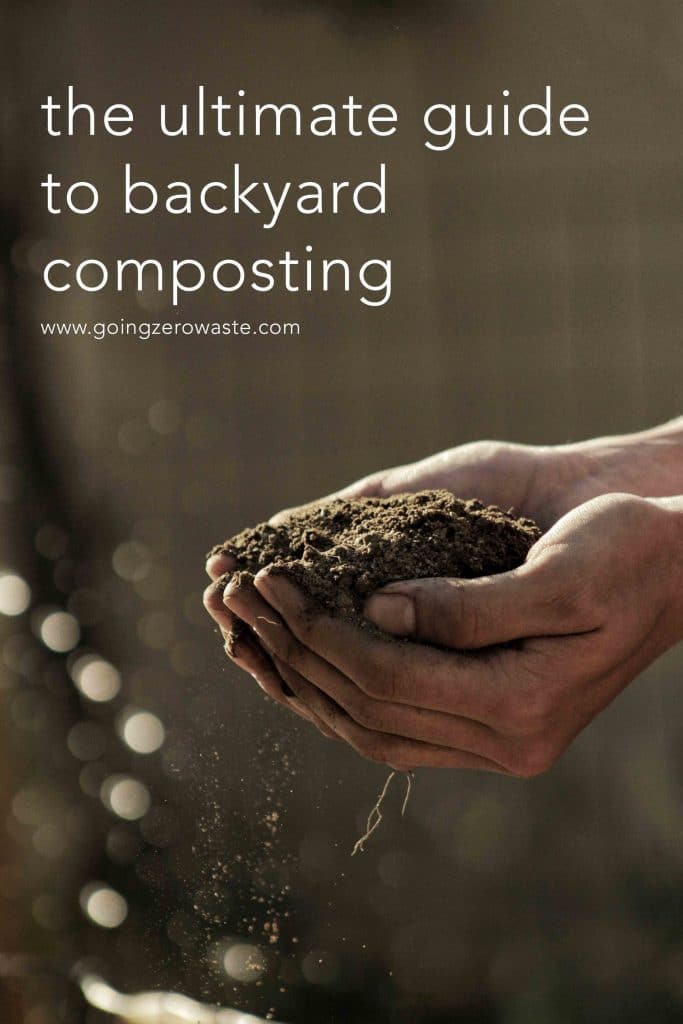
Table of Contents
organic compost
Composting is awesome! That might sound a little nerdy, but let’s use an apple as an example.
You pick an apple from the tree, you eat the apple down to the core, and you put the core in your compost pile which turns into a nutrient rich soil that you can use to grow more apple trees!
I believe we call this the CIRCLE OF LIFEEE! Thanks Lion King!
The average US household produces 650 lbs of organic trash a year, but most of that is landfilled. In fact, 60% of our landfills are full of organic matter.
You think it would break down since it’s dumped into a giant hole in the ground, but it doesn’t because landfills aren’t aerated.
It’s called anaerobic decomposition, and all of that oxygen deprived, organic matter now releases methane into the atmosphere.
Methane is 72% more powerful than CO2 which means it’s responsible for hastening climate related issues.
You can read more about greenhouse gasses in my post How to Offset Your Carbon Footprint and Why You Should.
Because organic and inorganic materials are mixed together, think of your trash bags, plastic, and food scraps it creates a perfect preserved atmosphere. Things like guacamole, hot dogs, and newspapers have been found in perfect condition from the 50s! (source)
Yup. Our food. Preserved. Forever. Releasing Methane. #notgood
In fact, Paul Hawken, the author of Drawdown and one of my personal heroes lists ending food waste as one of the top 10 ways for us to help reverse global warming.
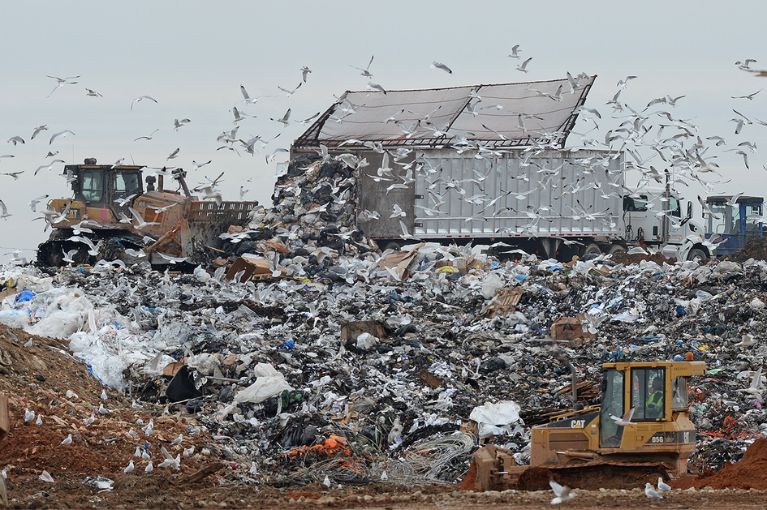
photo: greenvilleonline.com
backyard composting
I made you a handy chart full of what you can and can’t put in your compost pile. Pin it. Share it.
Place it by your fridge or your trashcan so you can make the most of backyard composting.
With just one simple swap, like making organic compost, you can drastically reduce the amount of trash you throw away each week!
Don’t believe me? Just check out this post on 3 Simple Swaps you Can Make to Cut Your Trash by 80%!
Now, in the graphic below, you’ll notice that some of the things have an asterisk by them.
Those are things that are accepted in industrial composting facilities, but might not be so great for a backyard composting environment.
Industrial composting facilities are heated which helps facilitate and speed up decomposition.
Composting piles in your backyard will take a bit longer for things to break down and things like oils, baked goods, meat, and cheese aren’t recommended because they will take a long time to break down and might attract critters.
With backyard composting you want to make sure that you keep it balanced between carbon and nitrogen.
Carbon heavy items are things like shredded paper, dried leaves, and cardboard. So, basically ordering that pizza in a cardboard box and ripping it into tiny pieces is GREAT for your organic compost pile!
Nitrogen heavy items are going to be your food scraps like kale stems, apple cores, etc. You want to work to keep at least a half and half balance.

guide to backyard composting
hire someone:
Sound like a little too much to deal with? You can always hire someone.
Typically with a quick google search you can turn up companies that are willing to take your organic matter and handle the composting for you like Compost Now for a small fee.
enclosed bin:
An enclosed bin is ideal for a backyard. It sits on the ground, has a lid, and is aerated along the tops and sides to help with decomposition.
At the bottom of the bin, there is a small door that can be opened to remove the fully developed organic compost while you keep adding new scraps to the top.
This method takes the longest to turn the scraps into soil. You can buy an enclosed bin or if you’re feeling crafty, you can DIY.
backyard compost tumbler:
A backyard compost tumbler is the EASIEST type of bin to use! It’s raised off the ground, which is really nice. It gives it a bit of extra critter protection.
You put your food scraps in the compartment, give it a tumble, and voila! In a few short months, you’ll have organic compost.
I recommend getting a tumbler with two compartments so once one is full and in the process of breaking down, you can keep adding your compost to the other side.
This is great for small backyards and balconies.
outdoor worm composting / vermicomposting:
Also, known as a worm bin. I had a worm bin 360 which I found on craigslist for $60. Woot Woot!
It did not come with the worms, so I bought them at a local bait shop. I couldn’t handle outdoor worm composting and sent 1,000 worms to worm heaven. May they rest in peace.
I LOVED having worms they were like my pets but they’re temperature sensitive and need to be kept inside.
Note: It’s not recommended that you give them too many citrus peels.
trench composting:
This is a very easy option, go into your backyard and dig a small hole around a foot deep, lace your scraps in the hole, and cover it up. The scraps should decompose in about a month.
For more compost knowledge check out what your town has available. You could be surprised. Here’s a handy guide for the different regions of the US. Also, very helpful when traveling.
other:
If you’re in an apartment or looking for more of a guide on what to do indoors be sure to check out my blog post Tips for Composting in an Apartment!
If you’re interested in learning more about soil regeneration, gardening, and getting your dirt on you’ve got to check out this class hosted by the lovely family from Brush with Bamboo.
frequently asked questions
what do you use compost for?
There are many uses for compost such as using it to mulch your gardens, add to flower pots, or use it to add nutrients to your fruit trees.
how do you know when compost is ready to use?
You’ll notice when you look at it, it smells very earthy and there aren’t any large recognizable food scraps. It should be a deep and dark color.
It’s important that you only use organic compost when it’s mature. Otherwise, it can hurt your flowers and plants.
Do you compost? What method do you use?


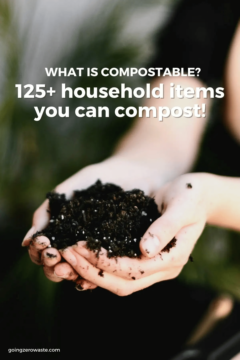





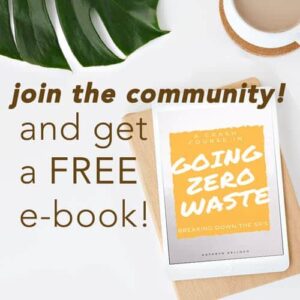

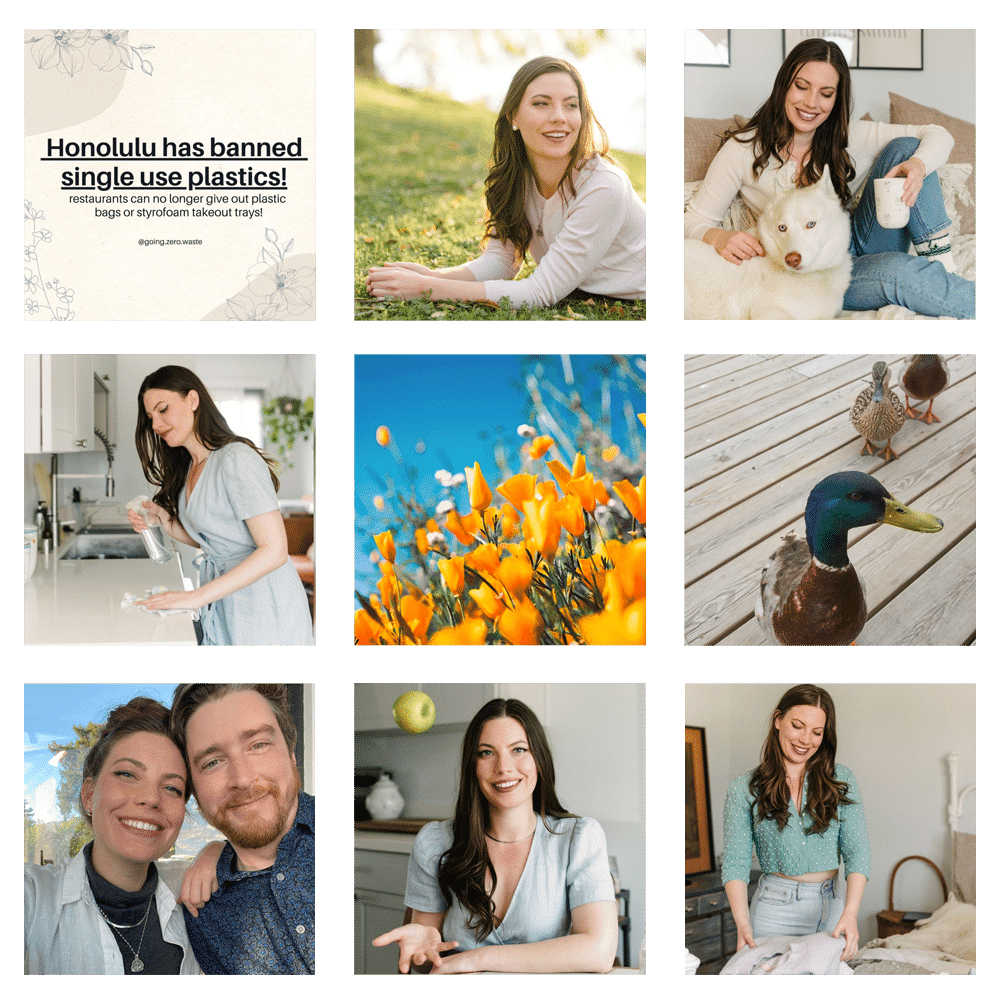
Woah Kathryn this is awesome I have been really trying to go less waste this year, and be super conscious about it – and I LOVE THIS idea! It’s totally something that I can do that’s super easy that makes a difference.
Bravo to you and your blog idea ! Can’t wait to follow along, love!
xo
Krista
http://www.hundredblog.com
Thanks Krista, you’re so sweet! I love your blog and traveling along with your adventures. Can’t wait to hear all about Vietnam!
This is something that I desperately want to get into this year and I am so glad you posted this. Very useful information for me 🙂
I am so glad you enjoyed it! I hope tons of people start composting this year. Think of the huge impact it would have!
I love this! I can tell you put so much work into it, it’s so useful. I use a composting service, which is perfect for my city-dwelling life. I’ll be sharing this post whenever anyone asks me about backyard composting from now on, hooray! PS – if anyone is interested in using a composting service (if backyard composting isn’t feasible for you for some reason), you can find one in your city here: litterless.co/wheretocompost !
As always, you’re so wonderful. Yes, I am ITCHING for my city to offer curbside! I will definitely be sharing your list!
I have wanted to compost forever! We got one of the covered/aerated bins from the city, but no one ever jumps on board with me! The bin has been sitting empty. I have, however, been saving egg shells and coffee grinds in an empty coffee container so I’m going to lug the bin in the back and put it to use!
Yes! You can do it! I keep all of my scraps in a mixing bowl in the freezer. Once it’s full, I take them to the compost pile. Maybe family members would be more likely to contribute if they only had to put it in the bowl?
I have wanted to start composting for a few years now, so really enjoyed this post! It’s not that easy finding the equipment to get started where I live, but hope to get something in place this summer
What a great post! Composting is such a huge part of reducing food waste and not enough people know how easy it is to start doing it at home. I’ll be sharing this!
Such a great idea! I really need to encourage my parents to compost since they have a big backyard!
xx katie // <a href="http://www.atouchofteal.com">a touch of teal</a>
Thank you!! We do compost – just not everything on your list – we will start right away, thanks again.
Great tips! I do compost, we have the enclosed bin, and you’re right it does take a long time, but it feels so good when you finally dig out that rich compost!
Hi! I LOVE your blog and IG! Quick question. I also use the compostable toothbrushes. Do you take out the bristles and add them to your trash? Or just toss the whole brush into the compost?
Also, do you by chance order your toothpaste from The Zero Market? I saw they have one option in a glass jar and wanted to try it. I also use baking soda with peppermint EO now. Thanks! And I look forward to many more posts!
Hi Alicia! Thank you so much! I have not pulled the bristles out of my brushes yet. I use one to separate my eyelashes and a couple for scrubbing hard to reach places. Once I do compost the end I will pull out the bristles. They’re nylon, check with your recycling plant to see if they’re recycled. If they aren’t, they’ll go in my trash jar.
I make my own toothpowder. I have a whitening one and a regular one. I will be sharing my recipe soon!
Love this blog, but your compost bins are all plastic 🙁 Maybe it would be better to link to a wooden composter, or to a site that sells wooden ones. Otherwise we are just buying plastic, that long term, will get holes in, and need disposing of. Wood can be burned, or actually composts over time through rot and decay. I do want to say thank you so much for making this site though, exceptionally inspirational, and full of great tips, and it all looks so pretty and beautiful too 🙂 Just fantastic.
http://www.compostbinsuk.co.uk/wooden_compost_bins.htm
These are just common examples of compost bins. Most of the wooden ones I’ve seen are exposed/open air. I don’t have any experience with one of those, and it wouldn’t be appropriate for downtown/small living. I linked to the composter I actually have, which is plastic. I bought it second hand and see these pop up second hand all the time. I always struggle between buying new and sustainable or second hand which is typically synthetic/plastic. I wrote a post about my mixed feelings. Thank you for including a link to some wooden ones, I’ll be sure to check it out! 🙂
Hello! I have a question for you:
A couple of years ago we made a compost bin, but we were constantly having problems with flies. Do you have any suggestions? I have done quite a bit of research on composting and have not found anything.
Thanks! And by the way, I love your blog!
Was it well aerated? I also keep soil/compost "Browns" by my compost bin to throw on top. The flies like the rotting food and dampness. Chop it up into small pieces so it will degrade faster and keep "Browns" on top to help absorb moisture/keep the bugs away.
Great article.Thanks for sharing.
I live in an apartment and unfortunately do NOT have a green thumb whatsoever, so what should I do with my compost when it’s done? Just throw it in the woods somewhere?
I know this is an old comment so maybe you’ve figured out what you want to do, but I’d say try and find a farmer’s market nearby and see if they’ll take it to grow their crops or if you know anyone who grows their own produce.
Great post with informative content. Thanks for sharing.
Hey Kathryn!
I’m writing a book about composting for school and I need someone who knows what they’re talking about to "judge" the quality of my book and also answer a few questions. If you could contact me by email that’d be great!
Thanks,
Gabrielle
[email protected]
I often come across people who consider composting too much work or not worth it. Some of these same people have gardens. I was so happy when my municipality essentially gave away compost bins to anyone who wanted one. It’s good to see information like this, and see compost bins (and other varieties of composting) sprout around the neighbourhood. Sustainability, one step at a time…
What about winter time in Utah? Just throw compostables in the bin (top loader type) and wait until spring?
Chicken poop go in composter too, right? They do eat bugs. Does this make them ominovres?
What about mouldy food? I’ve red that you should burn plants infected with mould.
I would really like to start composting, but I am having trouble figuring out how to go about it. My city doesn’t offer any composting locations or pickup, and I don’t do a garden/yards. I really don’t know what I would do with my compost! Any ideas?
In Germany we are lucky to have so many easy options to recycle. We have seperate trash bins for plastic waste, paper and composting waste. The paper bin is free. We have in every town (almost doesn`t matter how small it is) big container for glass and paper trash.
I’m still very confused. When you compost something, it becomes soil which can be used to plant new vegetables and herbs? Can I just use it as dirt…? I’m new to this, and I haven’t been able to plant anything successfully yet.
What if I mostly eat meat? What do I do with meat that can’t be composted, or anything that can’t be composted?
Try taking a look at the Bokashi method. You can compost all of your food scraps that way.
Thank you! I was inspired by your post and just sent a message to a craigslist seller to try to get a tumbler for my yard. My young kids will love to participate.
That’s awesome!
OK..I’ve been adding baking soda to my horse stalls thinking this was a good thing…to find out its killing the microbes…yikes. My compost pile is steaming hot and never has snow on it so I assumed all was well. What can I add to reverse what I have done??
Ok questions. I have been composting for over a year and agree with your list. BUT what do you do with your food waste that cannot be composted… I know I could get chickens or a pig to eat it but I’m not there. Just wondering what you’ve came up with 🙂
How would you recommend composting at a school?
I have started with a corner in my patio container garden. It is a corner with good shade, access to water regularly, just need to turn regularly. When I do, wow the earthworms I have!! I am planning on moving it to its own box container that I set up to grow plants but a large tree I have shades it too much, so….perfect for composting! After a really good rain I usually pull up weeds and when I did this year of course had a lot of earthworms so carefully I put them in a large pot container and will use this to help layer my new container compost pile. Also look under ground cover plants, like spider plants, they tend to have a lot of left over plant matter that can be moved to a compost pile to continue the journey! beautiful dirt. But this year I have NO BEES. I have roses, lemon tree in bloom, Jacaranda tree (think beautiful purple flowers) usually COVERED with bees, none. This really scares me. Now I want a beehive.
I tried an on the ground composter and we hated it, really hard to turn, took forever to make any compost so we gave up. I decided to give it another try and we purchased a 2 compartment tumbler. We love it! It gives us a load of compost every month so far. Not sure how it will go this winter but we have lots of hot days throughout the year so hopefully it will still work just a bit slower.
We used to live in a house with a garden and two compost bins, each 1m3 volume. When one was filling, the other was being emptied and the contents used on the garden; a good system. Now, the gardener of the family is disabled and we have moved to a house with a smaller but less work garden. Our family (4 of us) still generates compostable items such as kitchen waste, so we bought a small wooden compost bin (1/3 m3). A year later and this bin is full. We are frustrated because the story seems to have ended there. After 26 years of good composting, we have now had to default to what a lot of the UK population does, that is throwing the waste in the domestic waste bin, to be taken away to landfill and methane!
Do you have any ideas that we might not have thought about.
Many thanks,
Dave Haynes, Lancashire UK
Hi Kathryn,
I’m new to your blog, and glad to be here! My boyfriend and I recently began composting and we are using the bin outside that’s covered and has a small door to pull out the ready compost while we add to the top. We had read that you should turn your compost- do you recommend turning it? We have been, but with turning it I’m not sure how to tell when it’s ready to be used in the garden. Any advice would be greatly appreciated;